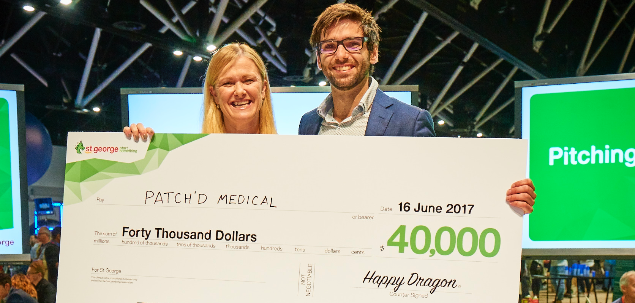St. George has awarded a total of $100,000 in business grants as part of its 2017 Kick Start program, a fast-paced, 60-second pitch competition hosted at TEDxSydney (16 June). In the New Business Idea category, Patch’d Medical and GoTerra out-pitched four other start-ups to take home first and second prize (a $40,000 grant and a $10,000 grant), respectively.
Patch’d Medical has developed a discrete patch, which enables physicians to remotely monitor a patient’s vital signs in real-time from their smart phones. Meanwhile, GoTerra is developing a modular, mobile insect farm that will enable users to convert food waste into livestock feed
Dynamic Business caught up with Robert Quinn, the co-founder of Patch’d Medical, and Olympia Yarger, the founder GoTerra, to discuss their businesses, their involvement in Kick Start, and pitching to the program’s judges – Cathy Yuncken (GM, Business Banking, St.George, Martine Jager (CMO, Westpac); Remo Giuffré (founder and licensee, TEDxSydney) and Taj Pabari (founder & CEO, Fiftysix Creations).
The origin stories
Quinn: Five years ago, I had a liver transplant, which meant I was in and out of hospital. During this time, I noticed a lot of people who were stuck in hospital because they needed their vital sign monitored. Considering the impact on quality of life, which in turn impacts patient outcomes, and the cost of keeping someone in hospital (it’s $800 night in Australia and nearly $2500 in the US a night), I started thinking, “how can I keep people out of hospitals?” This sparked the idea for a patch that monitors people’s vital signs in real-time without them needing to be in hospital. At the moment, we’re focused on three vital signs – heart rate, respiration rate and heart rate variability – but we’re looking to add the rest as we go.
Yarger: I wanted to start a small to medium sustainable farm; however, when I was writing my business plan, I couldn’t get the numbers to create a viable business plan due to the volatility of livestock feed price – it’s 70% of your production cost. I ended up googling a nutrient analysis of chicken feed and discovering that black solider fly larvae had the exact same components. The rest, as they say, is history.
Addressable pain points
Quinn: We’re addressing multiple pain points for multiple people. We’re helping patients to live normal lives and there’s evidence to show they recover better. Meanwhile, physicians can monitor trends in a patient’s vital signs to determine if intervention is necessary. From a healthcare perspective, there’s huge to keeping people out of hospital. At the moment, hospital spending is outpacing CPI, which is not sustainable. We need solutions like ours to address that.
Yarger: We’re not producing enough grain for livestock feed. In fact, by 2050, there’ll be a 20% shortfall in grain production. Further, food waste is costing the economy $20 billion a year. Using insects to process food waste and farming effluent and turn that into livestock feed is a sustainable solution to this problem. Insect farming today is largely manual whereas we’ve taken robotic and AI technology and designed the world’s first, commercial capacity mobile insect farm. Being both a food waste management service and a livestock feed production company, we have two revenue streams.
The Kick Start experience
Quinn: Pitching is a great exercise in general for companies. It’s an opportunity to take a step back and ask, ‘what are we actually doing?’ Being required to sum up Patch’d Medical in 60 seconds helped us really look at the core of our business and realise what was most important to us. Beyond the value of participating in the pitch competition, the Kick Start also gave us the chance to network with other small business owners. I’ve made some great connections that will really help the business, moving forward
Yarger: When you pitch, you can end up relying on the crutch of time – you want more time to tell people more things. Being able to express what your company stands for – and what it is going to deliver – in just 60 seconds is very empowering. Plus, the process of memorising your pitch is almost a process of affirmation – it’s a chance to really concentrate on your purpose. I feel really confident in who we are after going through the Kick Start program.
Pitching fundamentals
Quinn: A lot of people focus on the cold, hard facts but my reason for starting Patch’d Medical was very personal. As such, the most important thing for me is connecting emotionally with the audience while summing up what we do in a nutshell.
Yarger: It comes back down to the fundamentals… what’s the problem you’re solving, why should people care that you are going to solve it, why should they believe that you are going to be the one to solve it and how are you going to solve it? The technical things you could talk about for hours but that’s not really the core of what you’re doing – it’s the who, what, when, where.
The Kick Start grants
Quinn: I like to say we’re ‘Ramen Engineers’ in that we’re not living off much right now because we believe in what we’re doing. So, the $40,000 grant makes a massive difference to us. It extends our runway significantly in that it will help us unlock a 150-person trial with the University of Texas, with whom we’re having conversations. We’re focused on getting Patch’d Medical off the ground in the US ahead of Australia. Going through the regulatory process over there first will provide us with a larger addressable market sooner. From there, we’ll bring our product back to Australia to help people here.
Yarger: With the help of the $10,000 runner-up grant, we’ll build our first modular, mobile insect farm and begin turning food waste into livestock feed. We’ll start growing the enterprise from there – it’s really exciting.

